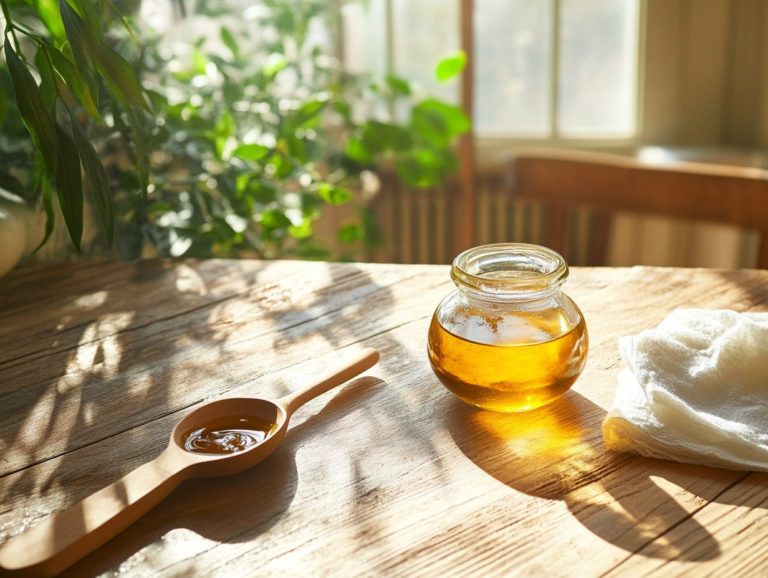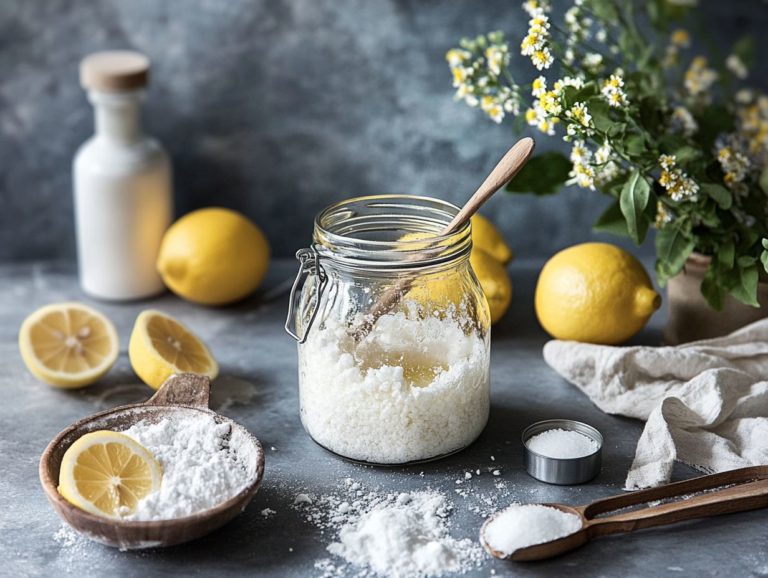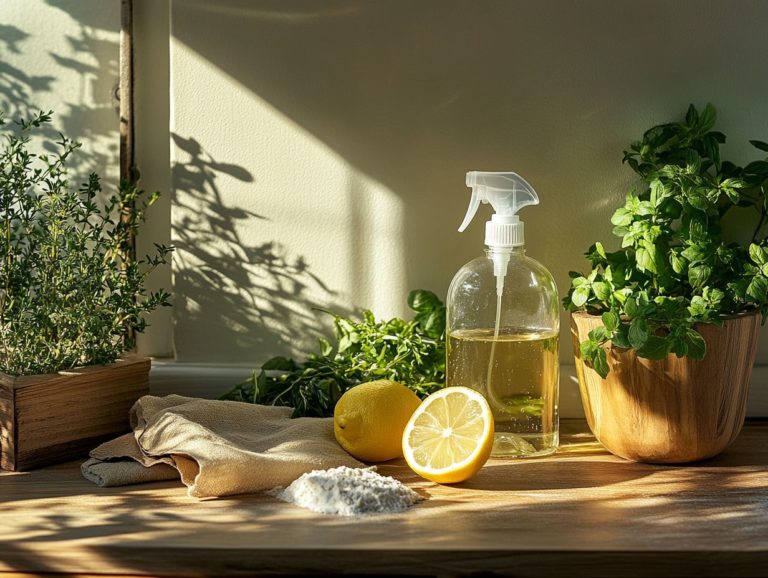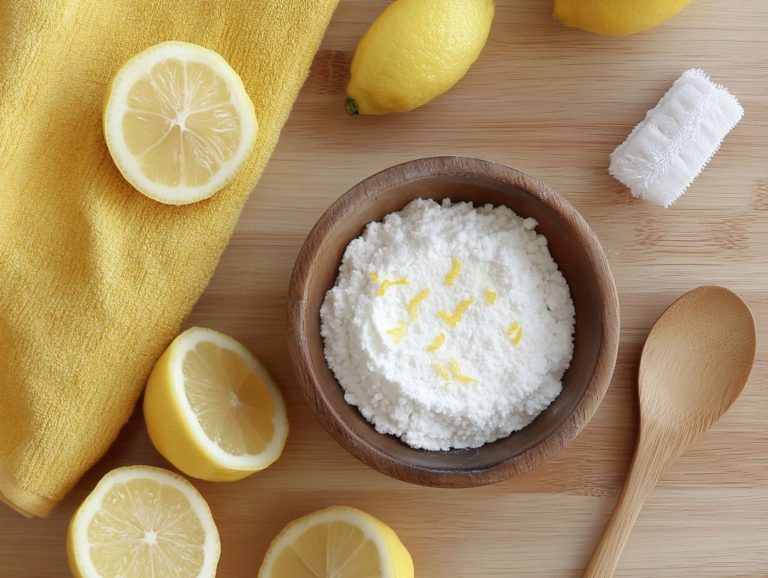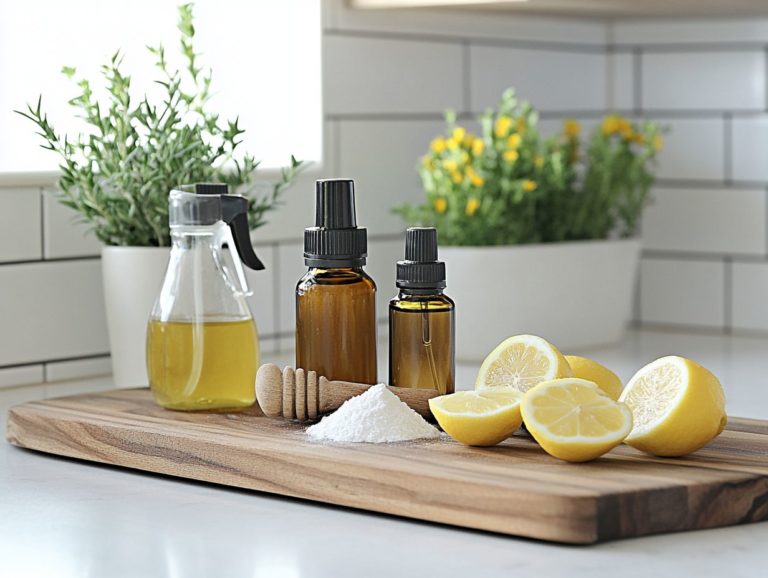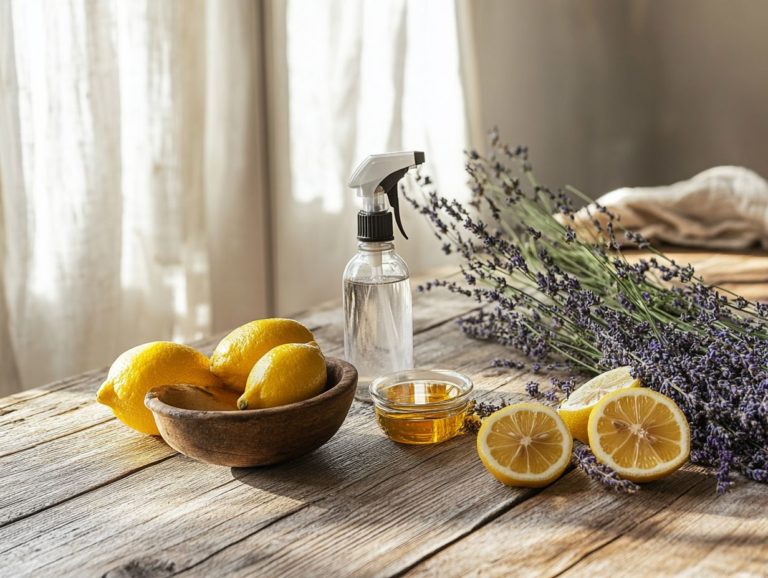Homemade Cleaning Products: What to Avoid
Have you ever thought about crafting your own cleaning products? This approach can save you money and empower you to take charge of your ingredients, steering clear of harmful chemicals often found in commercial cleaners.
This article explores the benefits of creating your own cleaning solutions, highlights ingredients to avoid, and presents safe, effective alternatives. You ll find easy recipes for making your own all-purpose cleaner, glass cleaner, and more using natural ingredients.
Get ready to elevate your cleaning routine with effective methods!
Contents
- Key Takeaways:
- Why Make Your Own Cleaning Products?
- What Ingredients Should You Avoid in Homemade Cleaning Products?
- What Are Some Safe and Effective Alternatives?
- How to Make Your Own Cleaning Products at Home?
- Frequently Asked Questions
- What are some common ingredients to avoid in homemade cleaning products?
- Why should I avoid using bleach in homemade cleaning products?
- Is vinegar safe to use in homemade cleaning products?
- What alternatives can I use instead of ammonia in homemade cleaning products?
- Can I use homemade cleaning products on all surfaces?
- Are there any eco-friendly ingredients I should avoid in homemade cleaning products?
Key Takeaways:
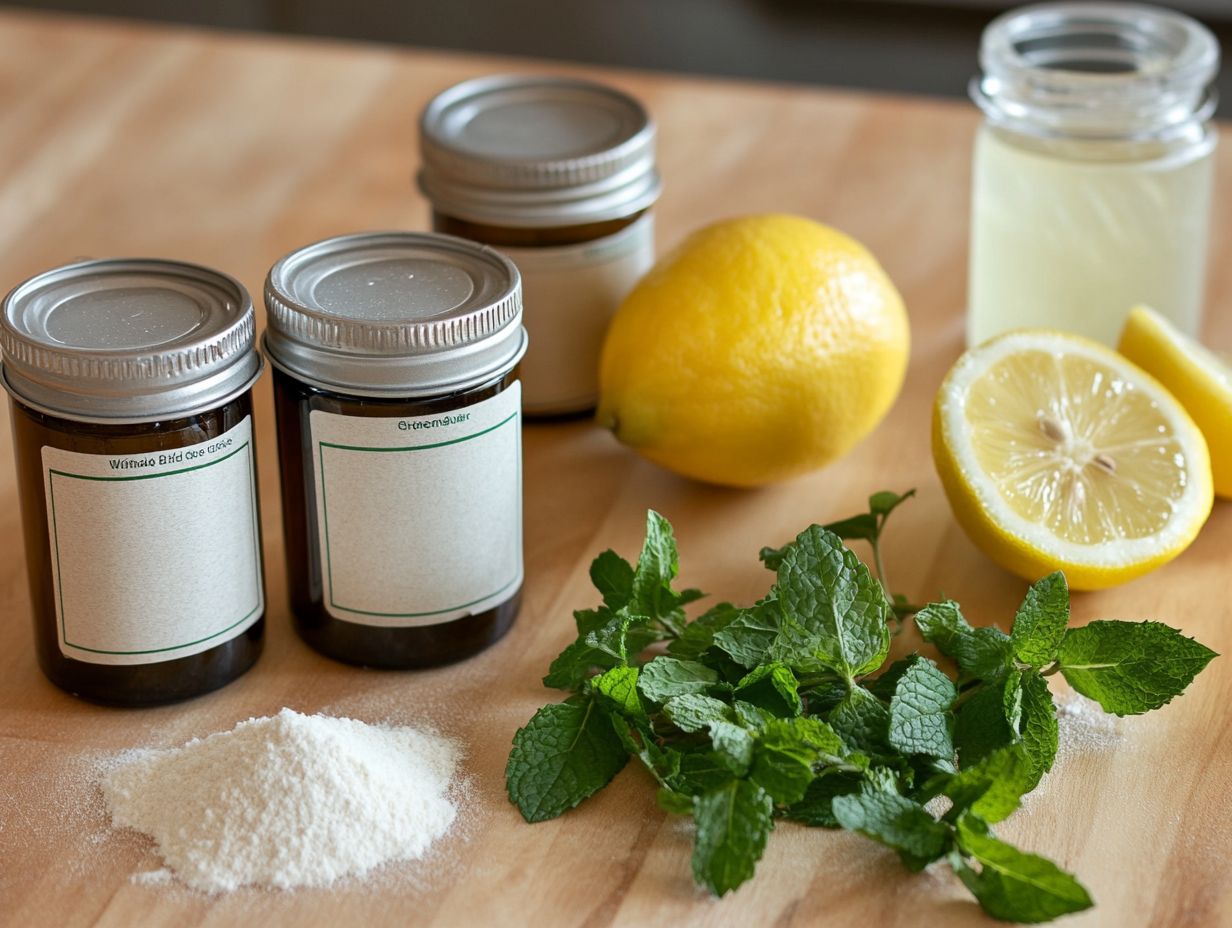
- Avoid harsh chemicals like bleach, ammonia, and hydrogen peroxide in homemade cleaning products as they can harm your health and the environment.
- Opt for safer alternatives like baking soda, castile soap, lemon juice, salt, and borax for effective homemade cleaning solutions.
- Making your own cleaning products is easy and cost-effective. Follow simple recipes for all-purpose cleaner, glass cleaner, toilet bowl cleaner, laundry detergent, and dishwasher detergent using non-toxic alternatives.
Why Make Your Own Cleaning Products?
Creating your own cleaning products gives you control over what you use in your home. It enables you to craft safer cleaning solutions that benefit your family and the environment.
Many commercial household cleaners contain harmful chemicals that can make you sick. Choosing natural alternatives significantly lowers the risk of respiratory problems, allergies, and other health concerns associated with toxic cleaning agents.
DIY cleaners made from natural ingredients like baking soda, white vinegar, and essential oils can help eliminate harmful substances. They are often more economical and environmentally friendly, promoting ecological cleaning.
What Ingredients Should You Avoid in Homemade Cleaning Products?
When crafting your own homemade cleaning products, be mindful of certain ingredients to ensure a safe and effective cleaning experience. Many conventional cleaning agents contain toxic chemicals like bleach, ammonia, and hydrogen peroxide. These can lead to serious health risks, including respiratory problems and hazardous waste during disposal.
By learning about the ingredients often found in household cleaners like synthetic fragrances and other harmful additives you can make informed choices. This knowledge will enhance your cleaning efforts and foster a healthier, chemical-free environment in your home.
1. Bleach
Bleach is a household staple trusted for its disinfectant properties, but it requires caution. While effective, using bleach can lead to respiratory issues and skin irritation. Its potent fumes can trigger asthma symptoms, making it unsuitable for families who prioritize health.
Bleach has environmental concerns due to its chemical makeup. When washed away, it contributes to air pollution and water contamination, reacting with organic materials to produce toxic byproducts that harm aquatic life.
If you’re aiming for a clean and safe home, consider effective alternatives. Products like vinegar, hydrogen peroxide, and baking soda can provide similar disinfecting benefits without the negative side effects associated with bleach. These natural cleaners minimize health risks and align with environmentally friendly practices, ensuring a safer space for your family and the planet. Explore biodegradable cleaners and bleach alternatives for a sustainable approach.
Start making your own cleaning products today for a healthier home!
2. Ammonia
Ammonia is a common ingredient in many commercial cleaning products. It is often touted for its impressive ability to cut through grease and grime. However, it also carries significant health risks that you should be aware of.
Inhaling ammonia fumes can irritate your throat and lungs. This can result in coughing and difficulty breathing. These effects pose particular dangers for children and individuals with asthma or other respiratory conditions.
Long-term exposure not only deteriorates indoor air quality but can also lead to chronic health problems and other lasting effects. Considering these risks, it s crucial to explore non-toxic cleaning alternatives that are equally effective against dirt and stains.
Options like vinegar, baking soda, and lemon juice serve as powerful cleaning agents. They offer a natural approach to maintaining cleanliness without jeopardizing your health.
3. Hydrogen Peroxide
While hydrogen peroxide is often celebrated as a more eco-friendly disinfectant, don t overlook the fact that it can still present certain health risks, especially when used in high concentrations. Overexposure can lead to respiratory irritation and skin burns. Always use this cleaning agent safely to protect yourself.
For your cleaning needs, it’s advisable to stick with a 3% concentration of hydrogen peroxide, which is generally safe for household use. This level effectively combats various germs that can make you sick without being excessively harsh.
If you prefer safer alternatives, consider using vinegar or baking soda. Vinegar boasts natural antibacterial properties, while baking soda acts as a gentle abrasive that helps tackle grime. Using essential oils like tea tree or lavender can enhance your cleaning routine and add a pleasant scent.
This combination provides you with a versatile toolkit for maintaining a clean environment without compromising safety.
4. Essential Oils
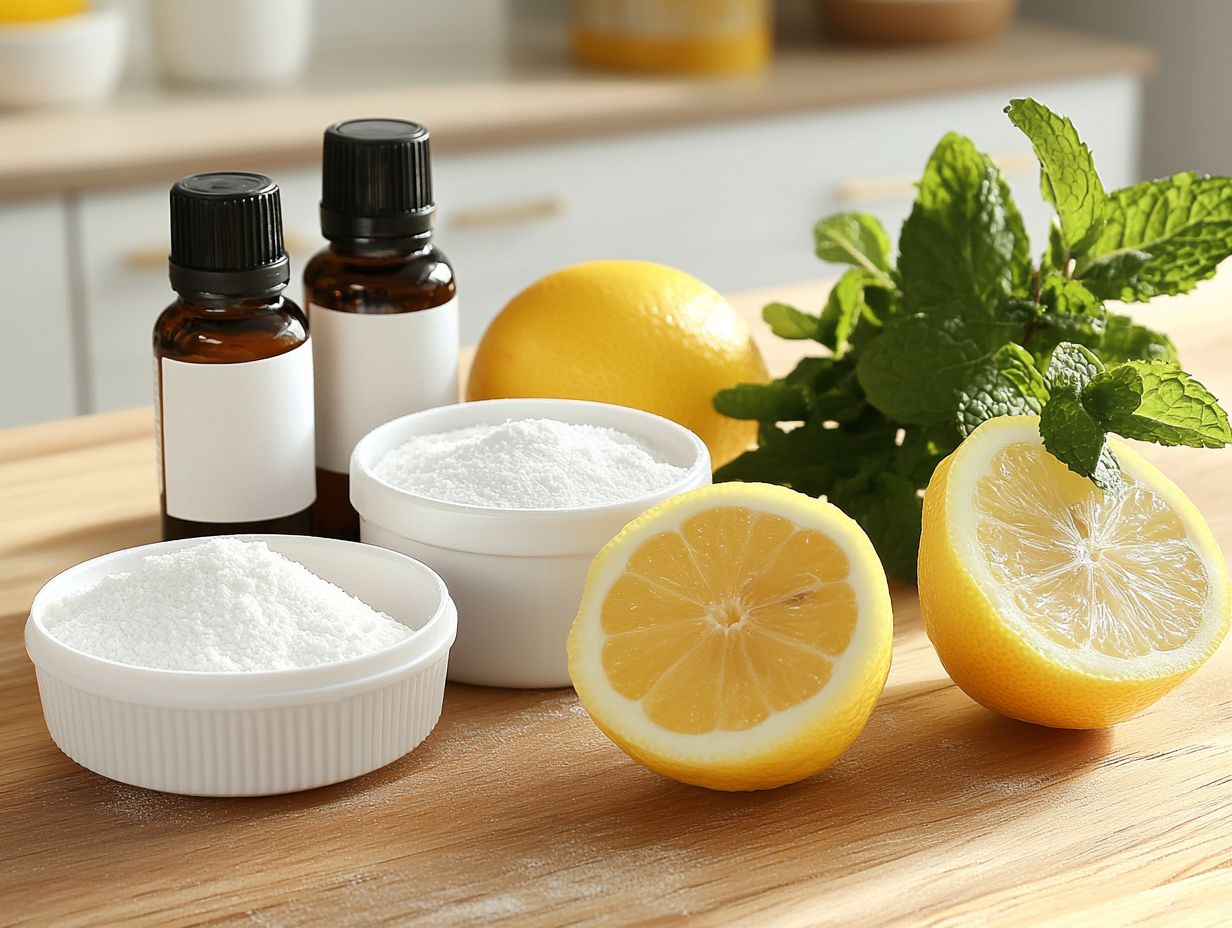
While essential oils are often celebrated for their delightful aromas and effective cleaning properties, it s crucial to recognize that they can pose health risks for some individuals, especially those with respiratory issues or allergies.
These oils can enhance your homemade cleaners with natural fragrances, but not all essential oils will suit everyone. Exploring fragrance-free options is essential for your safety.
Be mindful that certain oils may cause skin sensitivities or compromise indoor air quality, especially in enclosed spaces. Using essential oils in moderation can help reduce these risks, but selecting the right oils is vital. Always consider fragrance-free options if you have concerns about sensitivities or allergies.
If you re concerned about potential reactions, consider incorporating diluted vinegar or baking soda as effective alternatives. Using an essential oil diffuser in well-ventilated areas allows you to enjoy the aromatic benefits safely.
5. Vinegar
Vinegar, especially white vinegar, has earned its reputation as a go-to ingredient in many do-it-yourself cleaning ideas due to its natural cleaning abilities and ability to cut through grime effortlessly.
However, it s important to recognize that vinegar isn t suitable for every surface. Its strong smell can cause breathing problems for some people. This makes it wise to explore alternative cleaning agents. Consider using a mixture of vinegar and water for general cleaning tasks.
For example, you should steer clear of using vinegar on natural stone countertops like granite or marble. Its acidity can lead to erosion over time. It can also harm wood finishes and electronic screens, leaving behind unsightly spots or a clouded appearance.
To maintain a safe and eco-friendly cleaning routine, consider turning to alternatives like baking soda or lemon juice.
- Baking soda serves as a gentle abrasive that can effectively tackle tough stains.
- Lemon juice not only offers a delightful scent but also boasts natural antibacterial properties.
These alternatives can clean a variety of surfaces efficiently while avoiding the drawbacks that come with vinegar. Ecological cleaning products like soap nuts can enhance your sustainable cleaning efforts.
What Are Some Safe and Effective Alternatives?
When it comes to safe and effective cleaning, using non-toxic alternatives delivers outstanding results without the health risks linked to commercial products. These products align with the principles of the Toxic-Free Future initiative.
Ingredients such as baking soda, castile soap, lemon juice, salt, and borax are not just eco-friendly; they re incredibly versatile too.
These natural powerhouses are perfect for a range of cleaning tasks, from sprucing up your kitchen to disinfecting your bathrooms. They also align with the Safer Choice standards set by the U.S. Environmental Protection Agency.
1. Baking Soda
Baking soda is an extraordinary and versatile cleaning agent that often flies under the radar in the world of natural cleaning products. Its mild abrasiveness makes it perfect for scrubbing away tough stains.
Its remarkable ability to neutralize odors ensures that your home remains not only clean but refreshingly inviting. Don t let stubborn grime win; whip up a baking soda paste and show it who’s boss!
This unassuming ingredient can handle various cleaning challenges. When mixed with water, it becomes a powerful paste for heavy-duty scrubbing. It’s perfect for tackling baked-on messes in your kitchen or bathroom.
Thanks to its deodorizing properties, baking soda is also an excellent solution for combating unpleasant smells lurking in carpets and refrigerators. By embracing baking soda in your cleaning routine, you align yourself with an eco-friendly cleaning philosophy.
It s non-toxic, biodegradable, and free from harsh chemicals, contributing to a healthier environment in your home and beyond. Additionally, baking soda can be combined with hydrogen peroxide for more effective cleaning.
Try these natural cleaning agents today and experience the difference for yourself!
2. Castile Soap
Castile soap stands out as an exceptional choice for those who appreciate natural cleaning solutions. Crafted from vegetable oils and fully biodegradable, it represents a sustainable option for your household cleaning needs. With its gentle yet effective cleaning properties, you can utilize it for a wide range of tasks, from washing dishes to wiping down surfaces. It serves as a chemical-free cleaning agent, ideal for safer cleaning.
You’ll love how easily this remarkable soap fits into your DIY cleaning recipes! It caters to different household surfaces like countertops, floors, and bathrooms. For example, by mixing a few tablespoons of castile soap with water, you create a powerful multi-surface cleaner that tackles grime effectively, all without the use of harsh chemicals.
It’s also a fantastic ingredient for a simple window cleaner recipe, delivering a streak-free shine when paired with vinegar. You can mix castile soap with essential oils for aromatic oils that enhance cleaning efficacy.
In terms of laundry, incorporating a small amount of castile soap refreshes your clothes while remaining gentle on fabrics. Its adaptability makes it the go-to choice for environmentally conscious individuals who prioritize safety and efficiency in their cleaning routines.
Castile soap also acts as a powerful bathroom cleaner that kills germs, ensuring a hygienic environment.
3. Lemon Juice
Lemon juice isn t just a delightful addition to your culinary creations; it also doubles as a potent natural cleaning agent thanks to its acidic properties, which effortlessly break down stains and disinfect surfaces. The refreshing scent of lemon serves as a natural air freshener, making it a versatile ingredient in your cleaning arsenal.
Using lemon juice for your cleaning needs is both eco-friendly and budget-friendly, enabling you to maintain a fresh, hygienic environment without resorting to harsh chemicals. When diluted with water, lemon juice transforms into a powerful solution capable of tackling grime on countertops, cutting boards, and sinks.
This natural cleaning agent is also effective in kitchen cleaning, providing a chemical-free alternative. Don’t miss out on this budget-friendly and eco-friendly powerhouse for a sparkling clean home!
For a simple all-purpose cleaner, mix equal parts lemon juice and vinegar to create a robust disinfectant that not only cleans but also deodorizes your spaces. Additionally, when you blend lemon juice with baking soda, you create a paste that works wonders on stubborn stains in the kitchen and bathroom, showcasing the impressive versatility and effectiveness of this citrus marvel in your everyday cleaning tasks.
Lemon juice can also be used with citrus rinds for added cleaning power.
4. Salt
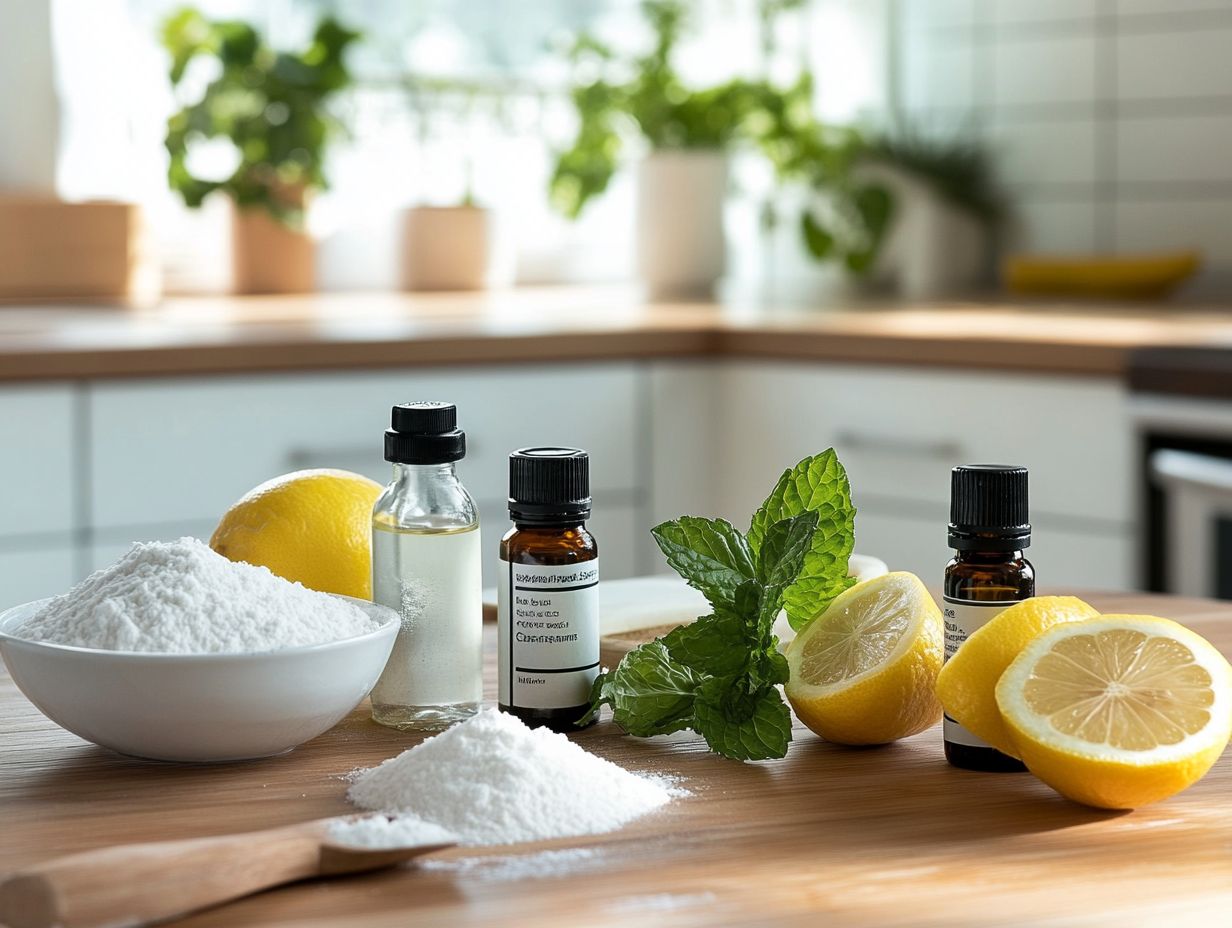
Salt is a simple yet remarkably powerful natural cleaning agent, celebrated for its abrasive properties, which means it can scrub away tough stains. You can combine it with other natural ingredients like vinegar and baking soda to craft an effective, eco-friendly cleaning solution.
In various cleaning scenarios, whether you re battling stubborn grease or disinfecting surfaces, salt reveals its versatility. When mixed with lemon juice, it transforms into a potent antibacterial scrub, ideal for kitchen counters and cutting boards.
You can sprinkle salt on carpets to absorb unpleasant odors or mix it with water to form a gentle yet effective paste for scrubbing pots and pans. Its non-toxic nature ensures that while you achieve a sparkling clean home, you re also protecting the health of your family members and pets.
By embracing salt as a staple in your cleaning routines, you not only enhance effectiveness but also promote a sustainable approach to maintaining your household.
5. Borax
Borax is a naturally occurring mineral that has likely found its way into your home. It is cherished for its exceptional cleaning and deodorizing properties.
As a non-toxic alternative in laundry detergents, it elevates your cleaning game. Its remarkable ability to enhance the effectiveness of detergents while remaining eco-friendly makes it a valuable ally in your commitment to an ecological cleaning routine.
Borax is a great example of a non-toxic alternative. It effectively replaces conventional commercial cleaning products.
This versatile compound goes beyond laundry, proving effective in enhancing stain removal and brightening your clothes. You’ll find it works wonders on various surfaces throughout your home, effortlessly tackling grime on countertops, floors, and bathroom fixtures.
Not only does it clean, but it also acts as a natural deodorizer, banishing unpleasant odors.
By incorporating borax into your cleaning arsenal, you contribute to a healthier indoor environment. This helps you steer clear of the harmful fumes often associated with harsher cleaning agents.
With its many uses, borax stands out as an ideal choice for anyone prioritizing sustainable living without compromising on cleanliness. Discover how eco-friendly products can transform your cleaning routine, making it effective and versatile!
How to Make Your Own Cleaning Products at Home?
Don t miss out on the opportunity to create your own cleaning products at home! This empowering endeavor enables you to tailor cleaning recipes with natural ingredients, ensuring effective cleaning without the detrimental effects of toxic chemicals.
With simple combinations like vinegar and water or baking soda paste, you can cover almost all cleaning needs. By harnessing straightforward components such as baking soda, white vinegar, and essential oils, you can craft an array of DIY cleaners that are safe for your family and gentle on the environment.
1. All-Purpose Cleaner (Eco-friendly and Effective)
An all-purpose cleaner is your best friend when it comes to tackling a range of surfaces throughout your home. It s an essential tool in any cleaning arsenal.
By utilizing the strength of natural ingredients like vinegar, baking soda, and essential oils, you can whip up a non-toxic alternative that cleans effectively while keeping your family and pets safe. It also reduces the risk of asthma triggers and respiratory issues caused by harsh chemicals.
This homemade marvel excels at refreshing countertops, kitchen appliances, bathroom fixtures, and even windows. It leaves everything sparkling clean without the harsh chemicals.
To make your all-purpose cleaner, mix one cup of distilled white vinegar and one cup of water in a spray bottle. Then, add about 10-20 drops of your favorite essential oil for a delightful fragrance.
This DIY cleaner is perfect for safer home cleaning. Before you get to work, give it a good shake to mix everything together.
Spray it onto the surface you wish to clean and wipe with a cloth for a flawless finish. Its natural properties do more than just tackle dirt and grime; they also help disinfect surfaces.
This cleaner is an efficient and eco-friendly choice for keeping your home pristine. Plus, these non-toxic alternatives are much safer for long-term use.
2. Glass Cleaner (Safe and Streak-Free)
A homemade glass cleaner crafted from natural ingredients is safe for your family and remarkably effective at achieving that coveted streak-free shine on your windows and mirrors. A simple concoction of vinegar and water serves as a superb non-toxic alternative to commercial glass cleaners packed with harmful chemicals. This chemical-free solution is ideal for those seeking fragrance-free options!
Creating this solution is quick and effortless. To prepare your very own glass cleaner, combine one part water with one part distilled white vinegar in a spray bottle.
This blend cuts through grime effortlessly, leaving your surfaces crystal clear! For the best results, use a microfiber cloth to avoid pesky lint on your glass, and steer clear of cleaning in direct sunlight, as that can lead to streaking. This recipe is highly recommended by the U.S. Environmental Protection Agency for household cleaners.
Perfect for a variety of surfaces, including car windows and glass tabletops, this homemade cleaner promises a spotless finish. Plus, you can have peace of mind knowing it s environmentally friendly.
3. Toilet Bowl Cleaner
Creating your own toilet bowl cleaner is simple and effective! By utilizing common household ingredients like baking soda and vinegar, you can combat stains and odors. This dynamic duo cleans and disinfects without the harmful chemicals often found in commercial toilet bowl cleaners.
When you mix these two ingredients, a delightful bubbly reaction occurs that helps lift grime and break down hard water deposits, making it the perfect solution for achieving a sparkling clean toilet. Baking soda acts as a gentle abrasive, scrubbing away stains, while vinegar, with its natural acidity, penetrates and dissolves mineral buildup, leaving your toilet with a refreshing scent.
This eco-friendly cleaner is completely safe for septic systems, ensuring that your cleaning efforts are gentle on the environment. You can keep your bathroom immaculate without draining your wallet! It also helps prevent asthma triggers and other respiratory issues often caused by harsh cleaning agents.
4. Laundry Detergent (Gentle and Eco-friendly)
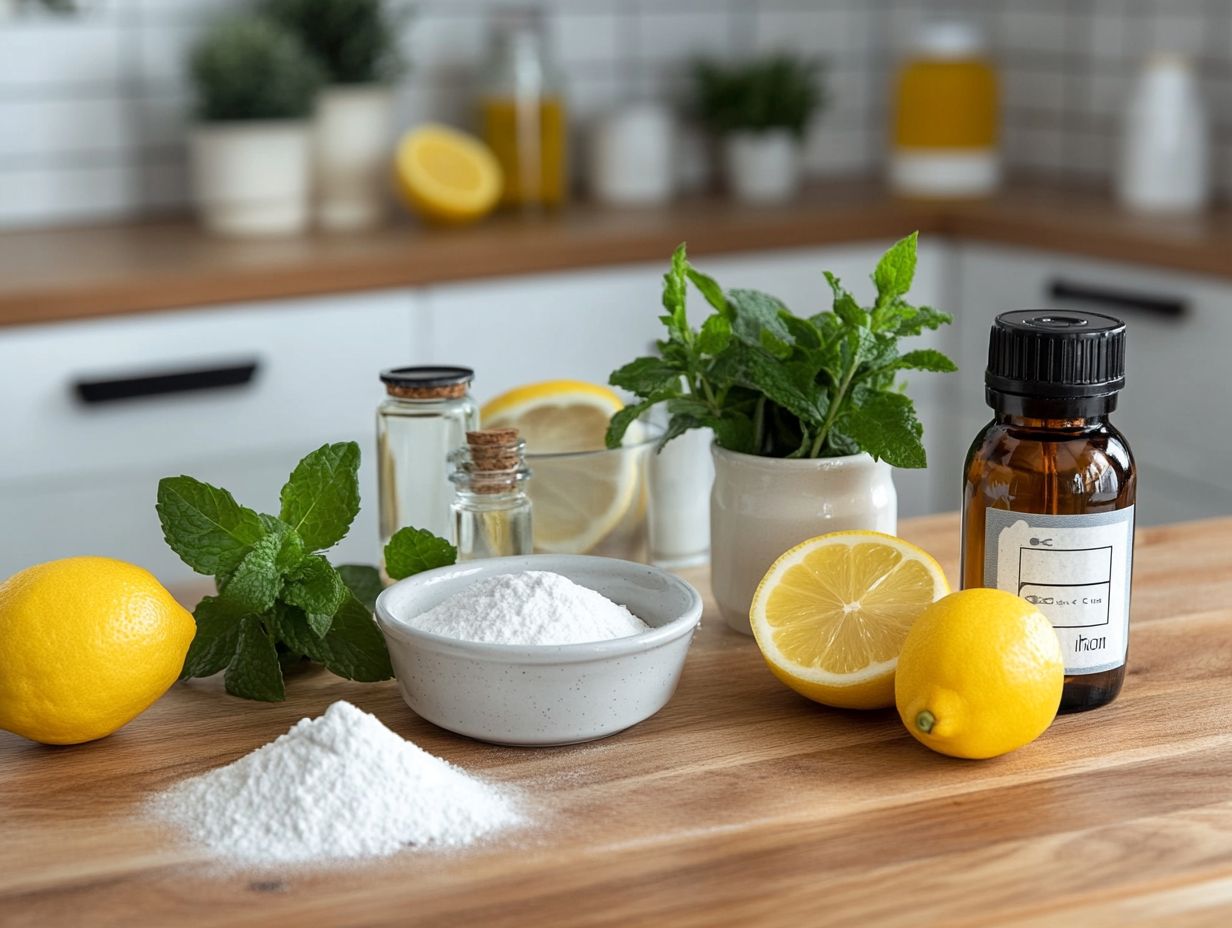
Crafting your own laundry detergent enables you to create a non-toxic alternative that is gentle on both your clothing and the environment. By using natural ingredients like soap nuts, baking soda, and essential oils, you can design an effective laundry solution that preserves the cleanliness and freshness of your fabrics. This homemade detergent is a notable substitute for commercial cleaning products and helps reduce hazardous waste in the environment!
This process lightens the chemical burden in your home and champions sustainability by reducing plastic packaging and the harmful runoff typically associated with conventional detergents. Soap nuts contain saponins, natural compounds that cleanse and soften fabrics, while baking soda acts as a powerful deodorizer and stain remover. Making your own homemade cleaners promotes safer cleaning and a toxic-free future.
Essential oils not only lend a delightful fragrance but also offer antibacterial properties that enhance the detergent’s effectiveness. Imagine your clothes smelling fresh while being kind to the planet! By opting to make your own laundry detergent using natural ingredients like soap nuts and castile soap, you are making a meaningful choice towards a greener lifestyle, demonstrating your commitment to both your garments and the planet.
Try making your own laundry detergent today and see the difference!
5. Dishwasher Detergent
Crafting your own dishwasher detergent with natural ingredients can lead to sparkling clean dishes without the harmful substances often found in store-bought options. Simple recipes that incorporate ingredients like baking soda, white vinegar, and lemon juice work wonders in breaking down grease and grime. This ensures the safety of your household by using eco-friendly products.
Homemade solutions allow you to save money and reduce your environmental footprint. This promotes a healthier home and offers peace of mind, knowing that no harsh substances or toxic chemicals are introduced into your kitchen. It also assists in the safe storage of cleaning supplies.
The combination of baking soda s mild abrasiveness and vinegar s natural acidity creates a cleaning action so powerful that it rivals even the top commercial detergents. You can add essential oils for a refreshing scent, enhancing your entire dishwashing experience while contributing to natural cleaning.
With such straightforward alternatives available, switching to homemade detergent is a sensible choice for anyone seeking effective and eco-friendly cleaning solutions. These non-toxic alternatives ensure effective cleaning and promote a toxic-free future.
Frequently Asked Questions
What are some common ingredients to avoid in homemade cleaning products?
Avoid ingredients like bleach, ammonia, and vinegar in homemade cleaning products. These substances can harm your health and damage certain surfaces, potentially causing respiratory issues and asthma triggers.
Why should I avoid using bleach in homemade cleaning products?
Bleach is a strong chemical that irritates the skin, eyes, and lungs. It can damage surfaces such as wood, stone, and metal. Mixing bleach with other ingredients can create toxic fumes, contributing to household hazardous waste and long-term health effects.
Is vinegar safe to use in homemade cleaning products?
While vinegar is natural, it can still be harmful if used in high concentrations or mixed with certain substances. Avoid using it on natural stone surfaces, as it may damage the finish. However, diluted vinegar and water solutions can be effective for many cleaning tasks.
What alternatives can I use instead of ammonia in homemade cleaning products?
Natural alternatives to ammonia include lemon juice, baking soda, and essential oils. These options are safer for your health and the environment, making them excellent choices for safer cleaning and household cleaners.
Can I use homemade cleaning products on all surfaces?
No, it is important to research and test homemade cleaning products before using them on all surfaces. Some ingredients may damage specific surfaces, so use products designed for the type of surface you are cleaning. Always consider the cleaning techniques and methods recommended for specific materials.
Are there any eco-friendly ingredients I should avoid in homemade cleaning products?
Yes, some eco-friendly ingredients like borax and hydrogen peroxide can be harmful if not used properly. It’s crucial to research and follow safety precautions when using these ingredients. For example, hydrogen peroxide should be used in well-ventilated areas to prevent respiratory issues.

